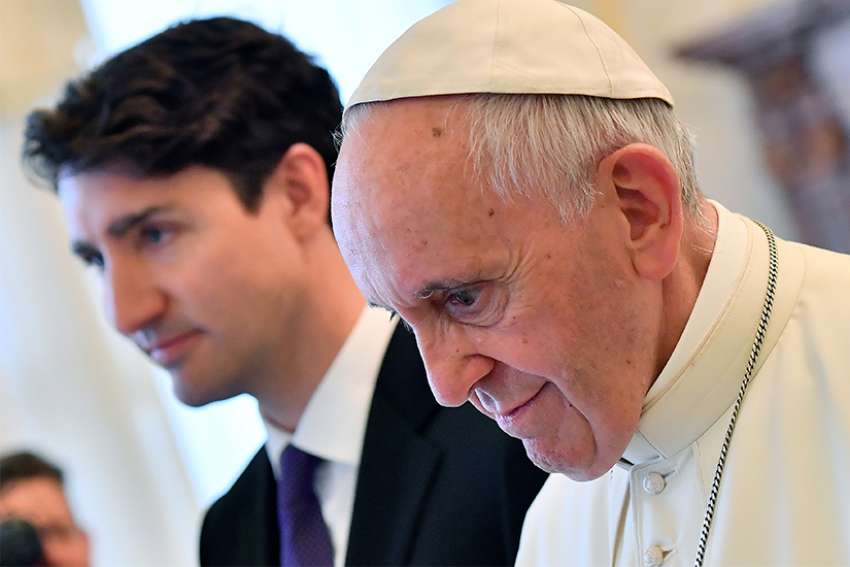A debate on the motion, a revised version of an earlier attempt by MP Charlie Angus to obtain unanimous support for a papal apology, heard no dissenting voices during an April 26 debate.
The motion will be put to a vote on May 1 and is expected to pass, if not unanimously, by an overwhelming majority.
MPs from both all parties voiced a desire for a papal apology on Canadian soil as called for in the Truth and Reconciliation Commission’s (TRC) 2015 report.
Conservative MP Garnett Genuis was absent from the fray. Genuis had refused to support a similar motion by Angus on April 18 that called on the Canadian Conference of Catholic Bishops (CCCB) to invite the Pope. The new motion, which is not binding on the government, bypasses the bishops and calls for the government to directly invite the Pope.
Angus described the debate as “a historic moment for the Parliament of Canada.” He said Parliament created the TRC to examine the evidence and the Commission found “the policies of the Government of Canada and the Catholic Church at the time constituted a genocide.”
Actually, the TRC report did not accuse any one of genocide. The report denounced the government, not the Church, for pursuing a policy of “cultural genocide.” It said the government’s Aboriginal policy was intended to assimilate Native children into Canadian culture, and called the establishment and operation of residential schools one element of that policy. Catholic entities, as agents of the government, operated about 60% of those schools and were guilty of physical and emotional abuse of children.
While the wording of the revised motion was softened after consultation with the Liberal government, Angus continued to take aim at Canada’s Catholic bishops, whom he has blamed for the Pope not accepting other invitations to apologize in Canada.
“I want to say that I have been appalled by the line I heard from the Canadian bishops,” he said. “They have tried to evade their role in working with us on reconciliation. We will talk today about the collusion of the federal government and the Church. They have followed a pattern time and time again of defending, covering up, and hiding for each other. It all comes back to liability. It all comes back to money.
“Does anyone think the survivors are here for money?” he asked.
Angus expressed confidence the Pope “is capable of understanding the importance of this motion, because he has a vision of reconciliation and justice for all.”
The Minister for Crown-Indigenous Relations Carolyn Bennett welcomed Angus’ motion and said she was “pleased to have worked co-operatively with him on some of the language.”
“Our government also wants to take this opportunity to show that reconciliation is not a partisan issue,” she said.
“The residential school system was a systemic plan to remove indigenous children from their homes, families, and cultures, and to facilitate the stated policy of ‘killing the Indian in the child,’” she said. “Students endured unconscionable physical and mental abuse, and generations of indigenous peoples were left emotionally scarred and culturally isolated.”
An estimated 150,000 Indigenous children attended residential schools over a period about 100 years, and the TRC estimated 6,000 of them died, she said.
Bennett pointed out Prime Minister Trudeau had already formally requested an apology, and that the government. She said she had written to the CCCB offering to facilitate a meeting with survivors so the bishops could “personally hear what an apology would mean to them and how crucial it is to reconciliation in Canada.”
The Conservative critic for Indigenous Affairs, Cathy McLeod said she would support the motion, though she noted the “need to respect the independence of religious organizations and their activities.”
“Some people say that Parliament is asking for an apology and that apologies should come from the heart,” she said. “Absolutely, apologies should come from the heart, and they can come often.”
She pointed out the motion is “an expression of how Parliament feels,” one she hopes the Pope will hear when he makes his decision. She stressed the motion is an invitation.
“An invitation is very different from a direction,” she said.
Ottawa poised to formally seek apology in Canada from Pope Francis
By Deborah Gyapong, Canadian Catholic NewsOTTAWA – A House of Commons motion to formally ask Pope Francis to apologize on Canadian soil for the Church’s role in residential school abuses appears set to pass with near unanimous consent.
Please support The Catholic Register
Unlike many media companies, The Catholic Register has never charged readers for access to the news and information on our website. We want to keep our award-winning journalism as widely available as possible. But we need your help.
For more than 125 years, The Register has been a trusted source of faith-based journalism. By making even a small donation you help ensure our future as an important voice in the Catholic Church. If you support the mission of Catholic journalism, please donate today. Thank you.
DONATE

